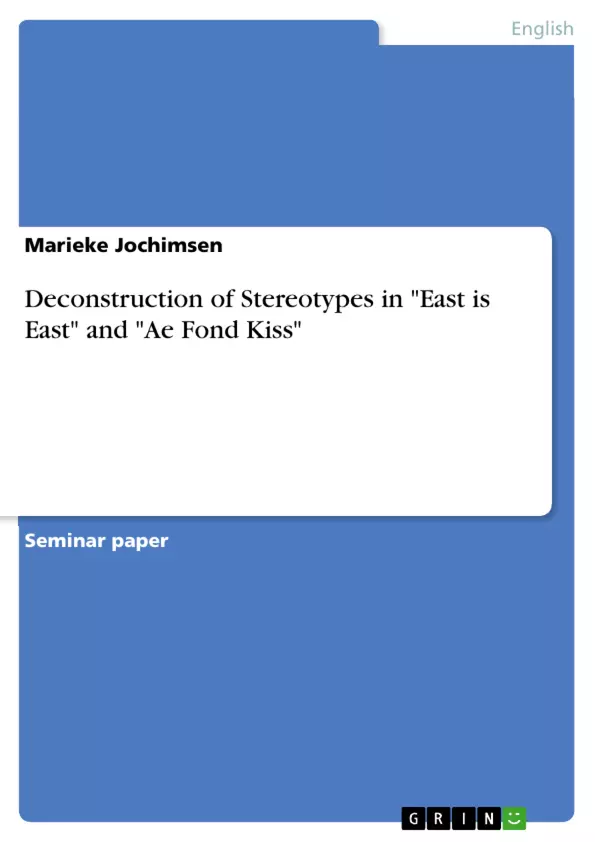“Oh East is East and West is West, and never the twain shall meet,
Till Earth and Sky stand presently at God’s great Judgement Seat;
But there is neither East nor West, Border, nor Breed, nor Birth,
When two strong men stand face to face, though they come
from the end of the earth!”1
Stereotypes exist everywhere around us and are a natural means to be able to talk about the world. However, they might result in prejudices and discrimination. The stereotypical division into “East” and “West” is evidently a too simplistic one, since there is nothing matching these expressions in the world.
This research paper aims to reveal methods of postcolonialism to overcome binary oppositions like “East” and the “West”, which have been constructed during colonial times through western conception and representation of the “East”. After briefly showing constitutive and simplifying characteristics of language in general, an introduction to Eward Said’s work Orientalism is given as an example of the creation of the ‘otherness’ of a specific group. Orientalism focuses on how and to which extend the Orient or the East has been created in western notions. By this means the necessity for postcolonial discourse is highlighted. This so-called rewriting of the past can also be observed in the Asian British diaspora. The movies East is East and Ae fond Kiss can be interpreted as an example for postcolonial discourse and an attempt to break national or ethnic stereotypes and binary juxtapositions.
Inhaltsverzeichnis (Table of Contents)
- Introduction.
- The relation between language and the world.
- Language as a construction of the world.
- Language as a simplification of the world: the origin of stereotypes.
- The power of representation: the portrayal of the 'East'
- Deconstruction of stereotypes in East is East and Ae Fond Kiss
- Elements of Humour in East is East.
- drawing parallels in Ae Fond Kiss
- Conclusion.
Zielsetzung und Themenschwerpunkte (Objectives and Key Themes)
This research paper explores the use of postcolonialism to overcome binary oppositions like "East" and "West", which were established during colonial times through Western perceptions and representations of the "East." It examines how language constructs reality, leading to stereotypes. The paper then analyzes the films East is East and Ae Fond Kiss as examples of postcolonial discourse and attempts to break down national and ethnic stereotypes.
- The relationship between language and reality.
- The role of stereotypes in simplifying complex realities.
- The portrayal of the "East" in Western discourse.
- The deconstruction of stereotypes in Asian British cinema.
- Postcolonial discourse and the rewriting of the past.
Zusammenfassung der Kapitel (Chapter Summaries)
The introduction sets the context by discussing the inherent limitations of language and the creation of stereotypes, particularly in the context of the "East" and "West" divide. The second chapter explores the structuralist theory of language, emphasizing its role in shaping our understanding of the world. It explains how language simplifies reality, leading to the formation of stereotypes. Chapter three delves into Edward Said's concept of Orientalism, highlighting how the West has constructed the "East" as a contrasting and inferior "other." The final chapter focuses on the films East is East and Ae Fond Kiss as examples of postcolonial discourse, analyzing how these films challenge and deconstruct stereotypes through humor and other techniques.
Schlüsselwörter (Keywords)
This research paper focuses on the themes of language, stereotypes, Orientalism, postcolonial discourse, and Asian British identity. It analyzes the films East is East and Ae Fond Kiss, highlighting how they challenge and deconstruct traditional representations of the "East" in Western culture. Key concepts include the construction of reality, the role of language in creating stereotypes, and the power of representation in shaping cultural understanding.
Frequently Asked Questions
What is the main objective of this research paper?
The paper aims to reveal methods of postcolonialism to overcome binary oppositions like "East" and "West" and analyze how language constructs reality leading to stereotypes.
Which films are analyzed in the context of postcolonial discourse?
The films "East is East" and "Ae Fond Kiss" are examined as examples of attempts to break national or ethnic stereotypes.
What is Edward Said's "Orientalism" about?
Orientalism focuses on how the "Orient" or the "East" has been created through Western conception and representation, often portraying it as an inferior "other."
How does the paper view the relationship between language and stereotypes?
It explores language as a construction and simplification of the world, which serves as the origin of stereotypes and potentially leads to prejudice.
What role does humor play in the analysis?
The paper specifically analyzes elements of humor in the film "East is East" as a technique to deconstruct stereotypes.
- Arbeit zitieren
- Marieke Jochimsen (Autor:in), 2008, Deconstruction of Stereotypes in "East is East" and "Ae Fond Kiss", München, GRIN Verlag, https://www.grin.com/document/148620



